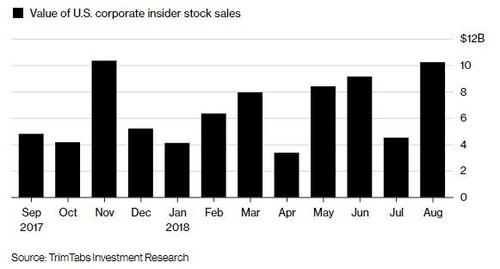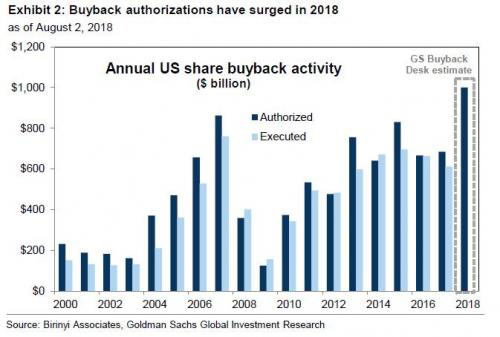Insider Selling Soars: Fastest Pace Of September Sales In Past Decade
Tyler Durden
 One month ago, we reported that insider selling reached $450 million daily in August, the highest level this year; on a monthly basis, insiders sold more than $10 billion of their stock, the most of any month this year and near the most on record. One month ago, we reported that insider selling reached $450 million daily in August, the highest level this year; on a monthly basis, insiders sold more than $10 billion of their stock, the most of any month this year and near the most on record.
"As corporate buying is at least taking a breather, corporate insiders are ramping up share selling as the major U.S. stock market averages are at or near record highs," TrimTabs wrote in a note.
One month later, TrimTabs is out with a follow up monthly report which finds even more of the same: according to the investment research company, the "best-informed market participants" are selling their own stocks at the fastest pace in September in the past decade, even as stock buyback announcements have hit record levels.

One month later, TrimTabs is out with a follow up monthly report which finds even more of the same: according to the investment research company, the "best-informed market participants" are selling their own stocks at the fastest pace in September in the past decade, even as stock buyback announcements have hit record levels.
Corporate insiders have sold an average of $400 million daily in September through Friday, September 21, TrimTabs founds, adding that this month’s volume of $5.7 billion is already the highest in any September in the past decade.
Of course this comes at a time of record corporate stock buybacks, resulting in a perverse loops in which insiders dumping near record amount of stock to their own, far less informed, shareholders.
“While insiders are selling hard with their own money, they’ve committed record amounts of shareholders’ money to prop up stock prices this year,” said David Santschi, Director of Liquidity Research at TrimTabs Investment Research.
Indeed, stock buyback announcements by U.S. public companies have already reached $827.4 billion in 2018, topping the previous record of $809.6 billion in 2007 with more than three months left in the year. According to Goldman, the final authorized buyback number will be no less than $1 trillion.

Meanwhile, as buybacks have boomed, U.S. Treasury tax data - contrary to reports from the Bureau of Labor Statistics - indicates that wage and salary growth has been depressed. Real growth in income tax withholdings hovered around 1% year-over-year in the past five months, far below the levels that prevailed last year.
Which may explain why corporate margins are set to hit new all time highs, and why insider selling is set to continue even as shareholders gladly buy all the shares that management has to sell.
The only question is what does management know that nobody else does...
 our mission: our mission:
to widen the scope of financial, economic and political information available to the professional investing public.
to skeptically examine and, where necessary, attack the flaccid institution that financial journalism has become.
to liberate oppressed knowledge.
to provide analysis uninhibited by political constraint.
to facilitate information's unending quest for freedom.
our method: pseudonymous speech...
Anonymity is a shield from the tyranny of the majority. it thus exemplifies the purpose behind the bill of rights, and of the first amendment in particular: to protect unpopular individuals from retaliation-- and their ideas from suppression-- at the hand of an intolerant society.
...responsibly used.
The right to remain anonymous may be abused when it shields fraudulent conduct. but political speech by its nature will sometimes have unpalatable consequences, and, in general, our society accords greater weight to the value of free speech than to the dangers of its misuse.
Though often maligned (typically by those frustrated by an inability to engage in ad hominem attacks) anonymous speech has a long and storied history in the united states. used by the likes of mark twain (aka samuel langhorne clemens) to criticize common ignorance, and perhaps most famously by alexander hamilton, james madison and john jay (aka publius) to write the federalist papers, we think ourselves in good company in using one or another nom de plume. particularly in light of an emerging trend against vocalizing public dissent in the united states, we believe in the critical importance of anonymity and its role in dissident speech. like the economist magazine, we also believe that keeping authorship anonymous moves the focus of discussion to the content of speech and away from the speaker- as it should be. we believe not only that you should be comfortable with anonymous speech in such an environment, but that you should be suspicious of any speech that isn't.
www.zerohedge.com
| 



